Haben Sie schon einmal versucht, einen Ihrer WordPress-Beiträge zu öffnen, nur um von einem 404-Fehler begrüßt zu werden? Manchmal erleben wir das, wenn wir an unseren eigenen WordPress-Seiten arbeiten oder unseren Benutzern helfen
Dieser Fehler tritt auf, wenn Sie auf Ihren WordPress-Administrationsbereich und Ihr Blog zugreifen können, aber wenn Sie versuchen, einen bestimmten Beitrag zu öffnen, erhalten Sie die Meldung „404 Not Found“.
Es kann frustrierend sein, wenn Ihre Inhalte scheinbar verschwinden, aber wir haben einige Lösungen gefunden, um dieses Problem zu beheben. In dieser vollständigen Anleitung zeigen wir Ihnen, wie Sie WordPress-Beiträge mit 404-Fehlern beheben können.
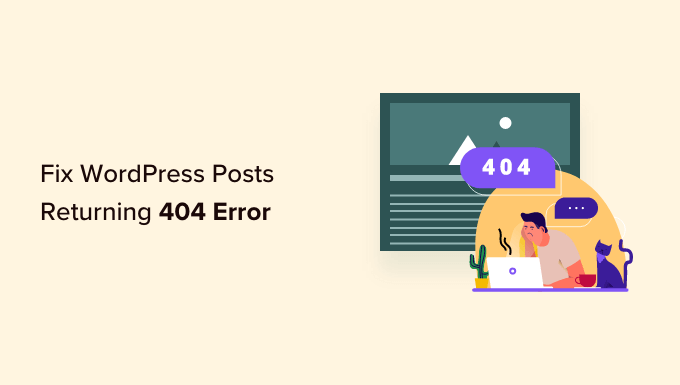
Warum erhalten meine WordPress-Beiträge einen 404-Fehler?
Es gibt mehrere Gründe, warum Ihre Beiträge in WordPress einen 404 „Seite nicht gefunden“-Fehler anzeigen. Diese können sein:
- Konflikte mit Plugins oder Themes: Manchmal können Plugins oder Themes, die Sie auf Ihrer Website installiert haben, die Handhabung von Permalinks durch WordPress beeinträchtigen. Dies kann zu fehlerhaften Links und 404-Fehlern führen.
- Probleme mit benutzerdefiniertem Code: Wenn Sie Ihrer Website benutzerdefinierten Code hinzugefügt haben, kann es sein, dass der Code Fehler enthält, die sich auf Permalinks auswirken oder andere Konflikte verursachen, was zu 404-Fehlern für Ihre Beiträge führt.
- Probleme mit Ihrer .htaccess-Datei: Die .htaccess-Datei spielt eine Rolle dabei, wie WordPress URLs strukturiert. Wenn diese Datei beschädigt ist oder fehlt, kann dies zu 404-Fehlern für Ihre Beiträge oder Seiten führen.
Wie man alle WordPress-Beiträge mit 404-Fehlern findet
Bevor wir zu den Lösungen kommen, wäre es gut, herauszufinden, ob der Fehler nur bei einem oder zwei Beiträgen oder bei mehreren Beiträgen auftritt. Auf diese Weise können Sie den Umfang des Problems bestimmen und die am besten geeignete Lösung wählen.
Eine einfache Möglichkeit, dies herauszufinden, ist die Verwendung der Google Search Console. Wenn Sie Ihre Website noch nicht bei Google Search Console angemeldet haben, lesen Sie unseren Leitfaden zum Hinzufügen Ihrer WordPress-Website zu Google Search Console.
Sobald der Google-Bot Ihre Website gecrawlt und indexiert hat, liefert Ihnen die Google Search Console detaillierte Informationen über die Leistung Ihrer Website, einschließlich aller 404-Fehler, auf die sie stößt.
Um herauszufinden, bei welchen Beiträgen 404-Fehler auftreten, können Sie sich im Dashboard der Search Console anmelden. Navigieren Sie dann zum Bericht „Seiten“ und Sie sehen eine detaillierte Liste aller Fehler.
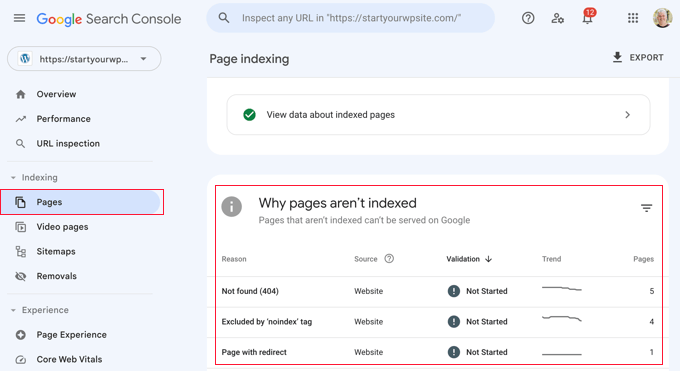
Weitere Informationen finden Sie in unserer Liste mit Tipps für die Verwendung der Google Search Console zur Steigerung des Website-Traffics, die auch einige Tipps zur Behebung von 404-Fehlern mit dem Tool enthält.
Sehen wir uns also an, wie man WordPress-Beiträge mit 404-Fehlern beheben kann. Sie können die Links unten verwenden, um direkt zu den verschiedenen Lösungen zu springen:
Keine Zeit, 404-Fehler selbst zu beheben? WPBeginner Pro Services kann helfen! Mit unserem erschwinglichen WordPress-Notfallsupport können Sie Experten beauftragen, 404-Fehler, defekte Links, Weiterleitungsprobleme und vieles mehr zu beheben. Hören Sie auf, sich über WordPress-Probleme zu ärgern und lassen Sie sie beheben! Vereinbaren Sie noch heute einen Notfall-Support für WordPress!
Methode 1: Suchen Sie nach Plugin- oder Theme-Konflikten und benutzerdefinierten Code-Problemen
Manchmal können Plugins, Themes oder benutzerdefinierter Code, den Sie zu Ihrer WordPress-Website hinzugefügt haben, Permalinks beeinträchtigen oder Konflikte verursachen, die zu 404-Fehlern führen. Wir haben das sogar schon selbst erlebt, als wir Tools auf unserer Demo-Website getestet haben.
Eine Möglichkeit, dieses Problem zu lösen, besteht darin, Plugins vorübergehend zu deaktivieren. Plugins können manchmal stören, wie WordPress mit Links umgeht.
Nachdem Sie die Plugins deaktiviert haben, können Sie sie nacheinander reaktivieren und dabei überprüfen, ob der 404-Fehler nach der Aktivierung der einzelnen Plugins erneut auftritt. Wenn der Fehler nach der Aktivierung eines bestimmten Plugins auftritt, könnte dieses der Übeltäter sein.
Sie können dann eine schnelle Google-Suche nach Lösungen für dieses Plugin durchführen oder den Plugin-Entwickler um Unterstützung bitten.
Auch Ihr WordPress-Theme könnte die Ursache für den Konflikt sein.
Um das zu überprüfen, können Sie vorübergehend zu einem Standard-WordPress-Theme wie Twenty Twenty-Three oder Twenty Twenty-Four wechseln. Dazu müssen Sie nur auf Darstellung „ Themes gehen und bei einem Standard-Theme auf „Aktivieren“ klicken.

Wenn der 404-Fehler mit dem Standard-Theme verschwindet, deutet dies auf einen möglichen Konflikt mit Ihrem aktuellen Theme hin. Sie können dann versuchen, das Problem mit dem Theme zu beheben oder ein anderes Theme zu verwenden.
In unserer Expertenauswahl der beliebtesten WordPress-Themes finden Sie Empfehlungen.
Wenn Sie kürzlich Codeschnipsel in Ihre Website eingefügt haben, kann es sein, dass der Code Fehler enthält, die die 404-Fehler verursachen. Schauen Sie sich den hinzugefügten Code genau an und prüfen Sie, ob Sie Fehler finden können.
Der sicherste Weg, Code-Schnipsel in WordPress einzufügen, ist das WPCode-Plugin. Mit diesem Plugin können Sie benutzerdefinierten Code einfügen, ohne direkt mit den Themadateien zu arbeiten, wodurch das Risiko, dass Ihre Website beschädigt wird, verringert wird.
Und wenn WPCode einen Fehler in Ihrem Code entdeckt, wird das Snippet automatisch deaktiviert und Sie werden aufgefordert, es zu überprüfen. Sie können auch den Testmodus verwenden, um zu prüfen, ob Ihr Code funktioniert, bevor Sie ihn auf Ihre Live-Website übertragen.
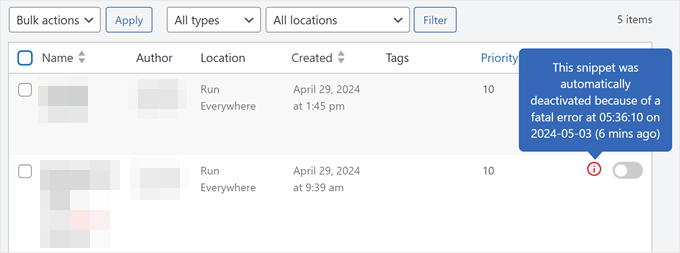
Wenn keine dieser Lösungen funktioniert, fahren Sie mit der nächsten Methode fort, bei der wir Ihre Permalink-Einstellungen überprüfen werden.
Methode 2: Reparieren Sie Ihre Permalink-Einstellungen
WordPress-Beiträge können aufgrund von Problemen mit Rewrite-Regeln in Ihrer .htaccess-Datei 404-Fehler zurückgeben. In den meisten Fällen können Sie das Problem beheben, indem Sie Ihre Permalink-Einstellungen aktualisieren.
Gehen Sie einfach zu Einstellungen “ Permalinks in Ihrem WordPress-Admin und klicken Sie auf die Schaltfläche „Änderungen speichern“.
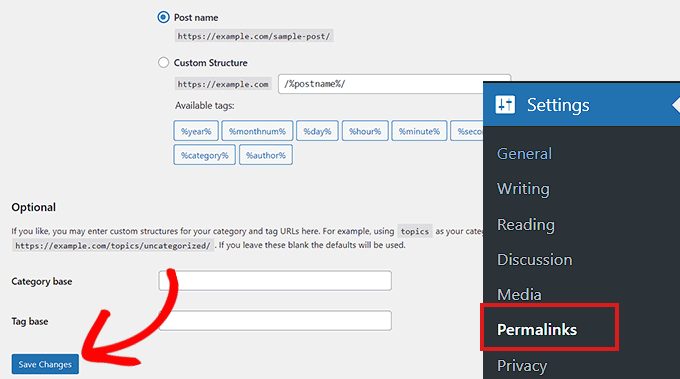
Es ist nicht notwendig, die Permalink-Einstellungen selbst zu ändern. Dadurch werden Ihre Permalink-Einstellungen aktualisiert und die Rewrite-Regeln geleert.
In den meisten Fällen behebt diese Lösung den 404-Fehler bei WordPress-Beiträgen. Wenn es bei Ihnen jedoch nicht funktioniert, müssen Sie wahrscheinlich Ihre .htaccess-Datei manuell aktualisieren.
Methode 3: Aktualisieren der WordPress-.htaccess-Datei
Bevor Sie beginnen, sollten Sie eine Sicherungskopie Ihrer WordPress.htaccess-Datei erstellen. Wenn etwas schief geht, können Sie die ursprüngliche Datei leicht wiederherstellen.
Nun müssen Sie eine Verbindung zu Ihrem Server herstellen, indem Sie einen FTP-Client wie FileZilla oder die Dateimanager-App in Ihrem WordPress-Hosting-Dashboard verwenden.
Als Nächstes müssen Sie die Datei .htaccess finden und bearbeiten, die sich am selben Ort wie die Ordner /wp-content/ und /wp-includes/ befindet.
Klicken Sie einfach mit der rechten Maustaste auf die Datei und wählen Sie „Dateiberechtigungen“.
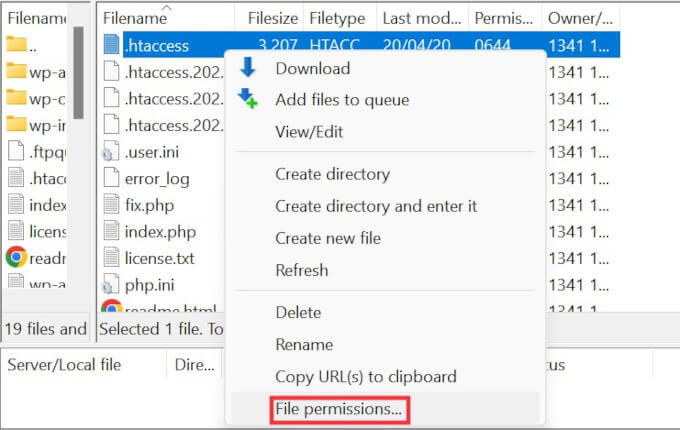
Sie können die Datei schreibbar machen, indem Sie ihre Berechtigungen auf 666 ändern.
Geben Sie einfach „666“ in das Feld „Numerischer Wert“ ein und klicken Sie dann auf „OK“.
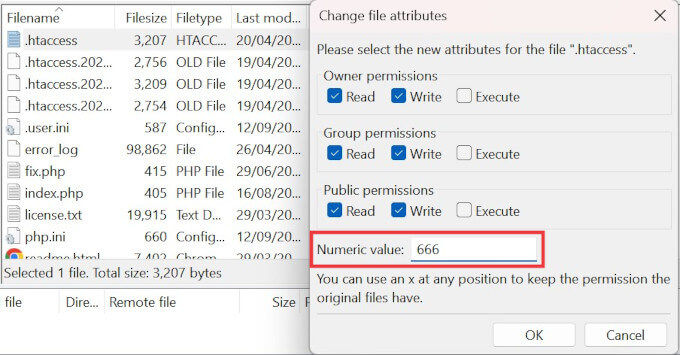
Dann müssen Sie die Schritte der ersten Methode unseres Tutorials wiederholen. Vergessen Sie danach nicht, die Berechtigungen wieder auf 660 zu ändern.
Sie können die Datei auch bearbeiten und ihr Code hinzufügen.
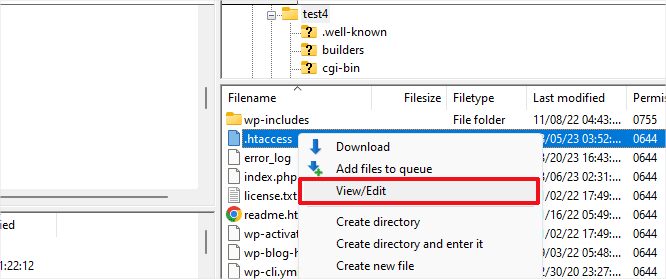
Nachdem Sie die .htaccess-Datei mit einem Texteditor geöffnet haben, fügen Sie einfach diesen Code ein:
# BEGIN WordPress
<IfModule mod_rewrite.c>
RewriteEngine On
RewriteBase /
RewriteRule ^index\.php$ - [L]
RewriteCond %{REQUEST_FILENAME} !-f
RewriteCond %{REQUEST_FILENAME} !-d
RewriteRule . /index.php [L]
</IfModule>
# END WordPress
Methode 4: Kontaktieren Sie Ihren Hosting-Anbieter
Wenn keine der oben genannten Lösungen das Problem der 404-Fehler bei WordPress-Beiträgen behoben hat, empfehlen wir Ihnen, sich an Ihren WordPress-Hosting-Anbieter zu wenden. Möglicherweise liegt ein Fehler auf dessen Seite vor, oder er kann Ihnen bei der Fehlerbehebung helfen.
Bitte lesen Sie auch unseren Leitfaden, wie Sie richtig nach WordPress-Support fragen und diesen auch erhalten.
Methode 5: Aktivieren Sie mod-rewrite (lokale WordPress-Installation)
Wenn Sie einen lokalen Server zu Testzwecken verwenden, müssen Sie mod_rewrite in der Apache-Konfiguration Ihrer MAMP-, WAMP- oder XAMPP-Site aktivieren.
Dies ermöglicht WordPress, saubere URLs zu generieren und den 404-Fehler für Beiträge und Seiten auf Ihrem lokalen Server zu vermeiden.
Wie Sie dies tun, hängt von der von Ihnen verwendeten Plattform ab. Benutzer von XAMPP können ihr Kontrollpanel öffnen und unter „Aktionen“ auf die Schaltfläche „Konfig“ klicken. Wählen Sie dann „Apache (httpd.conf)“.
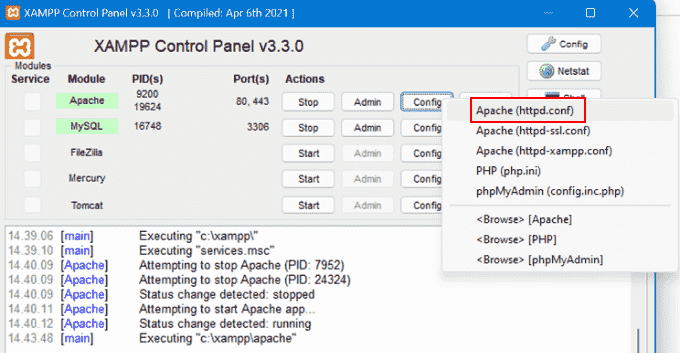
Als Nächstes müssen Sie diese Zeile #LoadModule rewrite_module modules/mod_rewrite.so finden und das ‚#‘ entfernen, um sie zu entkommentieren.
Dadurch wird mod_rewrite geladen.
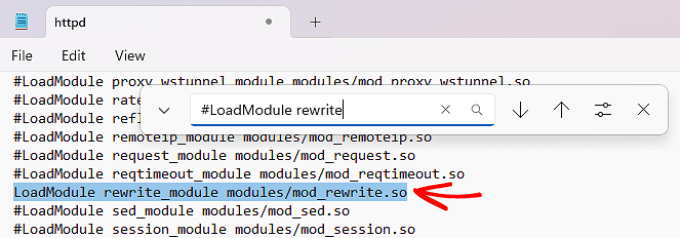
Suchen Sie dann alle Instanzen von AllowOverride None und ändern Sie sie in AllowOverride All.
Der Wert „Alle“ bedeutet, dass alle Direktiven überschrieben werden können.
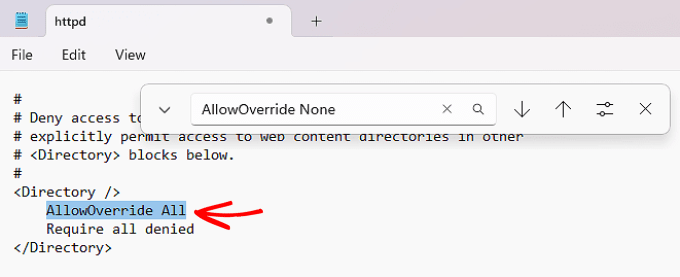
Danach können Sie die Datei httpd.conf speichern und schließen. Danach klicken Sie im XAMPP-Kontrollfeld auf „Stop“ für das Apache-Modul und erneut auf „Start“, um es neu zu starten.
Gehen Sie dann zurück zu Ihrem Admin-Dashboard, um zu sehen, ob Ihre Permalinks funktionieren.
Video-Anleitung
Wenn Sie eine visuelle Anleitung benötigen, sehen Sie sich einfach das folgende Video an.
Wir hoffen, dass dieser Artikel Ihnen geholfen hat, die 404-Fehler in WordPress zu beheben. Vielleicht interessieren Sie sich auch für unseren Leitfaden zu den häufigsten WordPress-Fehlern und deren Behebung sowie für unsere Expertenauswahl der besten WordPress-Plugins für das Wachstum Ihrer Website.
Wenn Ihnen dieser Artikel gefallen hat, dann abonnieren Sie bitte unseren YouTube-Kanal für WordPress-Videotutorials. Sie können uns auch auf Twitter und Facebook finden.





taher
My problem is a little different i do have access to my wp-admin, But i am unable to access to any page within wordpress, including dashboard or settings and re-directed to 404-error page. I have disabled cloudfare, but the problem persists.
WPBeginner Support
If the method in this article is not working you may want to try the general troubleshooting steps in:
https://www.wpbeginner.com/beginners-guide/beginners-guide-to-troubleshooting-wordpress-errors-step-by-step/
to see if it is due to a specific plugin or theme.
Admin
sikkandhar
great help, by just changing theme of wordpress, my 404 errors solved,
thank you for simple and great idea.
WPBeginner Support
Glad our guide could help
Admin
Oswaldo
Thanks for this amazing solution. I have a membership site and when i looked up to my mail this morning i have a lot of users that wrote that the cant access to the page because is showing the 404 error message and in fact this was happening, i didint know what to do, i thought it was some plugin or some function i put the night before….
Then i found this post, i saved again the permalinks as shown in this post and WORKED!!!
but i am not happy yet, i want to know why happened this problem? so this wont repeat again because all night while i was sleeping this problem happened
because all night while i was sleeping this problem happened 
please can you tell us, why happened this problem, so we can avoid this?
Thank you
WPBeginner Support
Sadly, it is difficult to say the root cause. It could have been an update from the host’s end or something on your site could have updated your permalinks incorrectly as some possibilities.
Admin
Lina Jin
I checked .htaccess and permalink settings too but its still not working.
In pages, I can see only some pages and others show errors.
‚Trying to get property ‚post_author of non-object in C:\xampp\htdocs\aaa\wp-admin\incldues\class-wp-posts-list-table.php on lline 1180‘
So the page links are not working and after login, the homepage is automatically redirected to wp-admin and dashboard shows nothing.
Can you help me with this?
WPBeginner Support
You would want to start with the general troubleshooting steps in: https://www.wpbeginner.com/beginners-guide/beginners-guide-to-troubleshooting-wordpress-errors-step-by-step/
You could also try updating your WordPress files using the method in: https://www.wpbeginner.com/wp-tutorials/how-to-manually-update-wordpress-using-ftp/
Admin
Harry
Thank you for this tutorial, solved my problem.
WPBeginner Support
Glad our article could help
Admin
kaleab
i had the same problem geting 404 error in post.php …it was frustrating but the only thing worked form me was change the the theme..and change it again…it worked for me………..
WPBeginner Support
Thanks for sharing what worked for you
Admin
TrigienIT
i had the same issue. tried the options above but they did not work until I also changed the theme to another, then reverted back to the normal theme.
José
None of the solutions worked for me. I can only acces to my home page, any other link like pages & post are not working. The update that caused this was the 5.0.3
WPBeginner Support
To ensure this is not a conflict with a theme or plugin you would want to take a look at this article for steps to try: https://www.wpbeginner.com/beginners-guide/beginners-guide-to-troubleshooting-wordpress-errors-step-by-step/
Admin
Nikki S
Wheew! This DID work for me. All I had to do was hit the Save button. So thankful for the article.
I just updated to WP 5.0.2 yesterday from 4.9.8. Could that have been the cause? It seems to run fine yesterday.
WPBeginner Support
As with any technology, there are many possible reasons. It could have been the update, a hiccup with the host, or another unknown reason.
Admin
Anjalai
am working in wordpress admin suddendly it showing 404 error message. so what am to do and i am beginner for wordpress
WPBeginner Support
You would want to follow the steps in this article and should none of them work, reach out to your hosting provider and they should be able to assist.
Admin
Okan
Thanks thanks thanks. You are the man!
Mike
Thank you so much. It worked. My site is fully back online. Thank you.
WPBeginner Support
Glad you found it helpful
Admin
RKapunan
Thank you so much. My links are back!
Jennifer Nelson
Thank you!!!!
Daniel S
I have tried all the suggestions from the article and some from comments.
Then I contacted my hosting company and it turned up that their ModSecurity module on the server blocked POST requests with „+src=“ string in it.
It could be different rule for you but if everything else fails try asking your hosting company to check if any request was blocked at the server level.
zak
thank you so much you are amazing, i love you so much, you are great, i searched a lot of pages and no one knows and teaches like you. you are awesome.
Thank you Thank you Thank you
Matzi
Thank you. It worked perfectly.
jay
this is happening to our site almost monthly and the only way to fix is to reset the permalinks in wp dashboard. debug log file is clean so i dont have any clue where to start fixing. any one having the same problem?
Ronny
I have the same problem! but I do not know where the problem comes from? does anyone know how to solve it?
Musab
Thaaanks many thanks
Arlene
My world was torn apart when I received this 404 error. Thank you WPBeginner for this helpful guide.
Jerry Bordadora
Thank you!! You save my me bro
Toyin
My issue has to do with the next page. I reduced the number of posts showing on my home page from 10 to 5, and when I click on the next page, it’s coming up with the 404 page not found
Aram
Hello! Thank You for interesting article! I have a little different problem. I want to redirect my 404 page to another, accurate and beautiful page. And normaly use plugins or template possibilities for that. But one of my sites, where there is the same template that I usually work with, the 404 page does not exist at all. Whatever I do. I get error telling that The requested document was not found on this server.
WPBeginner Support
Hi Aram,
Try updating your permalink structure. Simply visit Settings » Permalinks and then click on the save changes button without changing anything.
Admin
Ann-Jeanette
I cannot put in words how grateful I am for this exact article. THANK YOU
behdad
extremely helpful thanks
Renan
Works like a charm!
Morcio
It works, thanks THAAANKS a lot!!
Zihad
Thanks for such an easy solution.
Okereke Divine
This article is actually very very helpful.
But my problem seems to be different. Please WPBEGINNER, you guys should please and please help me…
I have tried the methods above but its not working. though my problem is kindoff different.
My problem is:
Sometimes, When I try to update my previous post or make a new post.., it redirects me to „404 error. Please and please help me.
WPBeginner Support
Hi Okereke,
Please try these steps. Go to Settings > Writing page and under the update services section delete any URLs in the box (Normally you will only see one URL rpc.pingomatic.com). Now click on the Save changes button to store your settings.
Try editing a post to see if this resolved your issue. If it didn’t then, please try steps in our WordPress troubleshooting guide.
Admin
Lisa Cox
This article saved me so much time….I was ready to scrap the whole thing and re-do the blog from the start because I thought I had made an irreversible mistake. Two clicks everything is fixed – THANK YOU! Sorry, I didn’t mean to sound like Dr. Suess. Enjoy your day!
Daulat khan
Hi! This article was helpful but when i put my site on google search bar ex, ac-universal.com/wp-admin an error 404 found how can i enter into my word press.
Guied ne thanks
WPBeginner Support
Hi Daulat Khan,
Have you tried the .htaccess method described in the article?
Admin
Mark Wayda
Just wanted to say thanks. Simple and effective fix for a problem that had been perplexing me for a few days!
joseph
thank you, this was very helpful
Khulu
Thank you Tom
Your solution works perfectly!!!!
Ash
Thanks. Your instructions worked 100%. It was driving me crazy.
Okereke Divine
Though my problem was that if i try to update my post., it redirects me to 404page.
I followed your instructions and it worked perfectly!
Collins
I can’t access my home page.
It keep saying 404 not found whenever i go to my url
Fernando Njaria
Thank you so much, had me going crazy with the 404 error, but after saving changes to the permalinks settings it worked!
Ibrahim Shabbir
I Cannot Even Access My Admin Page
Doni
That is my problem also. I can access my home page and one of the two top-nav pages, but I can’t access the second page, and I can’t get to /wp-login or /wp-admin.
Paulo
Awesome… saved my life, thank you
Tom
Great tips – for some reason, this didn’t completely fix my issue as AllowOverride was set to ‚None‘ in my httpd.conf file
Should anybody else run into the issues, simply edit your Apache2 httpd.conf file located in one of these locations: /etc/apache2/httpd.conf. /etc/apache2/apache2.conf.
Look for:
Options Indexes FollowSymLinks
AllowOverride None
Require all granted
And replace with:
Options Indexes FollowSymLinks
AllowOverride All
Require all granted
Hope this helps somebody!
Clinton
Thank you Tom,
I deployed a new site with Google One Click Deploy and missed some instructions about setting the AllowOverride All for the docroot directory. Your reply along with this article helped me get this working again. With AllowOverride set to None .htaccess files are ignored, so the directives to use make permalinks work, fail. In my case the config that I needed to edit was /etc/apache2/sites-available/wordpress.conf which had the directory of the wordpress install with the AllowOverride None set.
My Real Name
Thank you sir. You are my hero right now. I looked at so many sites and not a single one of them mentioned this. It wasn’t even obvious from the apache manual, to the extent that I read that.
Dipak Vasava
Thank You very, problem solved. its working code.
Simran
Thanks a lot..nothing to say. It really helped me. You done a great work..Thank you so much
Lagz
Worked like a charm, Thanks!
Contact form 7 Ajax was not working, giving me the feedback 404 error in console log.
I did not suspect rewriting rules until I read this.
Saving the permalink settings did the job!
Thank you
Favour
am confused, at the .htacess what I saw there was 0644 not 660, how do I go about it.
JP
Thank you for posting this- it saved me a ton of time- Cheers!
prabhat pandit
very helpful information for me
Richard
Thank you very much!!
Prabhat
thank you very much. for a moment i felt all my work is gone. you saved me
Sonja
Thank you!!! This was an awesome guide. Made my evening a lot better!
eriab nsereko
Thx WPB team, it worked like charm and that’s why I really love this mighty site!